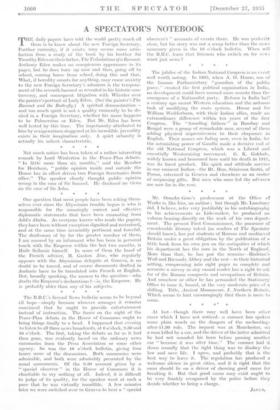. The jubilee of the Indian National Congress is an
event well worth noting. In 1885, when A. a Hume, son of the famous Parliamentary "guardian of the public purse," created the first political organisation in India, no development could have seemed more remote than the emergence of a Nationalist party. Reform in India half a century ago meant Western education and the arduous task of modifying the caste system. Hume and Sir William Wedderburn, with their Indian allies, made an extraordinary difference .within ten years of the first Congress. The "funding fathers " in Bombay and Bengal were a group of remarkable men, several of them adding physical impressiveness to their eloquence in English. Their names arc fading now, even in India, for the astonishing power of Gandhi made a decisive end of the old National Congress, which was a Liberal and essentially Westernising movement. G. K. Gokhale, widely known and honoured here until his death in 1915, was its finest product. His spirit and attitude survive in one eminent Indian—the Rt. Hon..Srinivasa Sastri, of Poona, esteemed in Geneva and elsewhere as an orator of surpassing gifts. But men who once led the advance are now far in the rear.


































 Previous page
Previous page